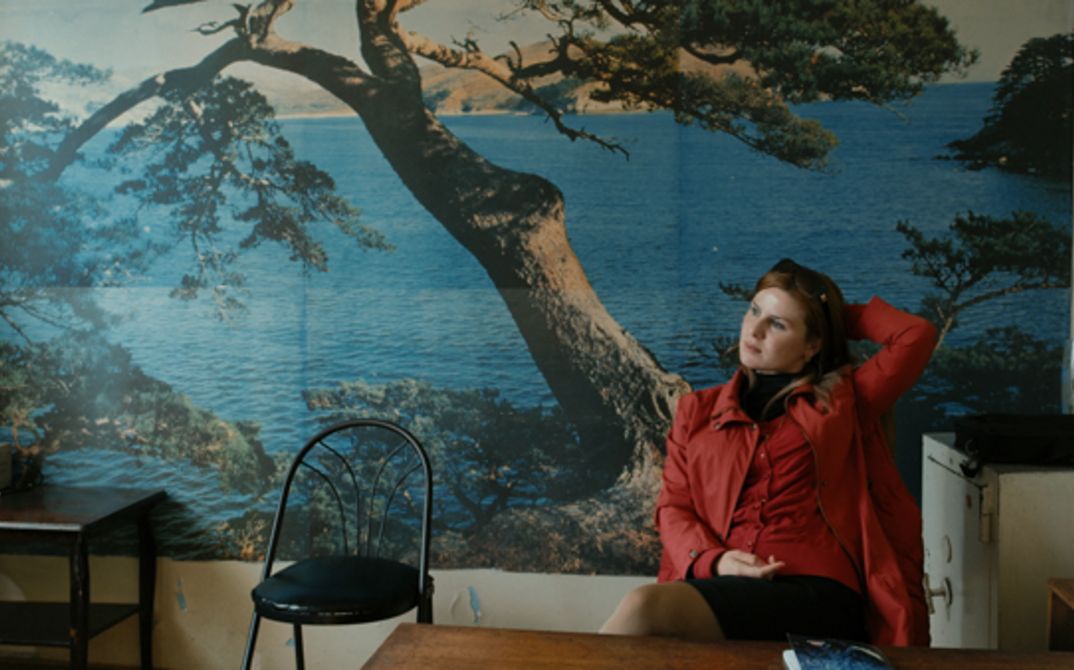THE DAZZLING LIGHT OF SUNSET (Salomé Jashi, Georgia/Germany 2016, 25.10., with guest Salomé Jashi) With the help of a local TV station, the film creates a pseudo-ethnographical portrait of a small town, a place in which rituals and traditions determine the rules of everyday life, with the modern world also increasingly entering the consciousness as a far-off reflection. What’s the best way to depict oneself? The wide range of characters, locations, and events create a mosaic of the small town and a portrait of the entire nation in which appearances seem to trump content. Jashi’s radical film shows that Georgian documentary film, if not the whole society, is in a raw state.
ON THE MOVE (Tsira Gvasalia, Georgia 2013, 29.10.) depicts the seemingly serene and passive everyday lives of the residents of an old people’s home, which are, however, at second glance characterized by intense passions and numerous interests. These old people still have dreams and cling onto the last things they love in life, in full awareness of the fact that they no longer have much time left.
ALTZANEY (Nino Orjonikidze, Georgia 2009, 29.10., with guest Nino Orjonikidze) The 87-year-old Altzaney is an authority in the Pankisi valley. The local inhabitants come to her with their problems, as well as the bodies of the dead to be mourned. How was a woman able to gain such authority in one of the most patriarchal places in Georgia – a place where tradition holds greater sway than the law even today?
UN DRAGON DANS LES EAUX PURES DU CAUCASE (The Pipeline Next Door, Nino Kirtadze, France/Georgia 2005, 29.10.) In one of the Georgia’s most beautiful valleys, the village of Sakire is shocked by plans by British company BP to build an oil pipeline supposed to stretch from the Caspian Sea to the Mediterranean. The construction work would destroy the landscape, although financial compensation is meant to provide an incentive for the locals. The atmosphere grows ever more heated, before descending into chaos and open conflict between then the oil company and the representatives of the village. Will the pipeline finally split the village community in two or does it offer a convincing perspective for affluence and comfort?
THE THINGS (Nino Gogua, Georgia 2016, 31.10., with guest Nino Gogua) The focus is on the last and only things the refugees forced to move within Georgia during the Russian-Georgian war of 2008 were able to take with them when they fled from their home villages in South Ossetia. Via the relationships between these things and their owners, the everyday life of refugees comes into focus: THE THINGS tells the universal story of what it feel like to have had to flee.
WHEN THE EARTH SEEMS TO BE LIGHT (Salome Machaidze, Davit Meskhi, Tamuna Karumidze, Georgia 2015, 31.10.) The film tells the story of young skateboarders and musicians who lose themselves in the contradictory reality of a post-Soviet country – a country in which one can be crushed by the power of the church and politics. A dense look at the world of adolescents in search of freedom and romance. (kg)
The Heinrich-Böll-Stiftung’s film series can be seen in other cities in Germany in October and November.
Further information can be found here.



